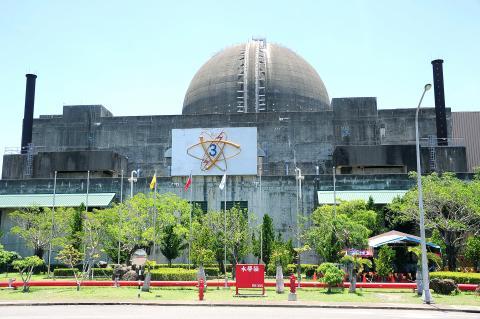Social rights activists and politicians toppled a red-brick wall symbolizing the fears and concerns of female victims of sexual abuse or domestic violence to demonstrate their determination to protect and safeguard women's rights.
The activity was organized by the nonprofit Garden of Hope Foundation to mark its 20th anniversary. The organization is committed to helping girls and young women who face a difficult plight, especially those in the sex trade or are victims of sexual abuse and domestic violence.
Commending the foundation’s role as a savior of women suffering from abuse or violence over the past 20 years, former vice president Annette Lu (呂秀蓮) voiced her hope that the public would show greater concern for abused women.

PHOTO: LIU HSIN-DE, TAIPEI TIMES
Lu urged the new government to allocate more funding to women’s affairs and social welfare in addition to their focus on national defense and foreign affairs.
Minister of Justice Wang Ching-feng (王清峰), the first woman to hold the post, said that while the foundation had devoted itself to caring for female victims of violence or abuse, “there is still room for us to make more effort.”
Democratic Progressive Party Chairwoman Tsai Ing-wen (蔡英文) pledged to make protection of women’s rights a top party issue.
“The DPP will continue to safeguard women’s rights and will continue to monitor the government’s social welfare policies,” she said.
Foundation CEO Chi Hui-jung (紀惠容) said her foundation would continue to care for women and girls in need.
“The Garden of Hope Foundation will do its upmost to stop sexual violence and promote gender equality,” she said.
Since its establishment in 1998, the foundation has cared for more than 100,000 women in its 35 centers around the country.
From one halfway house, the foundation’s services have grown to include shelters and service centers nationwide providing everything from counseling and temporary housing to employment training, social work and legal assistance.

A fugitive in a suspected cosmetic surgery fraud case today returned to Taiwan from Canada, after being wanted for six years. Internet celebrity Su Chen-tuan (蘇陳端), known as Lady Nai Nai (貴婦奈奈), and her former boyfriend, plastic surgeon Paul Huang (黃博健), allegedly defrauded clients and friends of about NT$1 billion (US$30.66 million). Su was put on a wanted list in 2019 when she lived in Toronto, Canada, after failing to respond to subpoenas and arrest warrants from the Taipei District Prosecutors’ Office. Su arrived at Taiwan Taoyuan International Airport at 5am today on an EVA Air flight accompanied by a

An essay competition jointly organized by a local writing society and a publisher affiliated with the Chinese Communist Party (CCP) might have contravened the Act Governing Relations Between the People of the Taiwan Area and the Mainland Area (臺灣地區與大陸地區人民關係條例), the Mainland Affairs Council (MAC) said on Thursday. “In this case, the partner organization is clearly an agency under the CCP’s Fujian Provincial Committee,” MAC Deputy Minister and spokesperson Liang Wen-chieh (梁文傑) said at a news briefing in Taipei. “It also involves bringing Taiwanese students to China with all-expenses-paid arrangements to attend award ceremonies and camps,” Liang said. Those two “characteristics” are typically sufficient

A magnitude 5.9 earthquake that struck about 33km off the coast of Hualien City was the "main shock" in a series of quakes in the area, with aftershocks expected over the next three days, the Central Weather Administration (CWA) said yesterday. Prior to the magnitude 5.9 quake shaking most of Taiwan at 6:53pm yesterday, six other earthquakes stronger than a magnitude of 4, starting with a magnitude 5.5 quake at 6:09pm, occurred in the area. CWA Seismological Center Director Wu Chien-fu (吳健富) confirmed that the quakes were all part of the same series and that the magnitude 5.5 temblor was

Restarting the No. 2 reactor at the Ma-anshan Nuclear Power Plant would take up to 18 months, Minister of Economic Affairs J.W. Kuo (郭智輝) said today. Kuo was answering questions during a meeting of the Legislative Yuan’s Economics Committee, where legislators are considering amendments to the Renewable Energy Development Act (再生能源發展條) amid concerns about the consequences of the Pingtung County reactor’s decommissioning scheduled for May 17. Its decommissioning is to mark the end of Taiwan’s nuclear power production. However, Chinese Nationalist Party (KMT) lawmakers have proposed an amendment to the Nuclear Reactor Facilities Regulation Act (核子反應器設施管制法) that would extend the life of existing